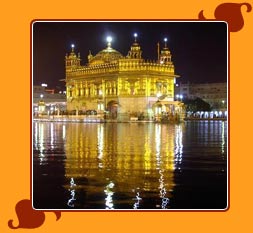Golden Temple in Amritsar is a place frequented by Sikhs
all round the year. Countless pilgrims visit Golden Temple to pay homage to
the holy shrine. Golden Temple is also known as Hari Mandir meaning Temple
of God.
 History
of Gurudwara
History
of GurudwaraThe origin of the place Amritsar is still mysterious in
the history. There are several legends that explain the existence of the
pool of nectar (also called Amrit Kund). The History of Gurudwara Golden
Temple in Amritsar can be traced in following steps of its evolution.
Originally
the site of Golden Temple was a low-lying are filled with water in the
centre (called Dukh bhanjani beri) and surrounded by a large number of shady
trees in a jungle. The area formed a commercial link between India and
Afghanistan, so it was visited by a number of traders. Still nobody talked
about the pool before Sikh Gurus visited it.
Nearby
Religious PlacesAkal Takht:Akal means timeless
(eternal) and Takht means throne, so Akal Takht means the Throne of Eternal.
It is one of the five sacred Takhts of Sikhs namely Takht Shri Damdama
Sahib, Takht Shri Keshgarh Sahib, Takht Shri Patna Sahib and Takht Shri
Hazoor (Hazur) Sahib. It is the chief seat of Sikh religious authority. Akal
Takht is constructed in the premises of Golden Temple in Amritsar. It has
full authority to summon and order penitence on persons charged with
violation of religious discipline. It is the oldest Takht among all the five
Takhts.
Baba Atal:Baba Atal Ji was the son of Guru
Hargobind Ji and Mata Nanaki Ji. He was born at Amritsar on 23 October 1619.
In Gurbilas Cheevin Patshahi, the story of his extraordinary death is
mentioned. He died when he was nine years old. The story goes like this:
Atal Rai had a friend by the name of Mohan. One day while playing till late
evening Atal Rai won.
Both the friends mutually agreed that Mohan
would take the turn the next day. At night Mohan was stung by a snake and
died on the spot. Atal Rai Ji went to see him at his home. He saw his family
members wailing and crying badly. Baba Atal Ji went near his friend's body
and touched his body with a stick saying: get up Mohan. It is not the time
for a sleep…. Why are you sleeping soundly? You owe us forfeit."
Mohan stood up. The news spread like fire. Guru Hargobind Ji became annoyed.
He told Atal Rai Ji to not to go against God's providence.
Gurudwara
Lohgarh Amritsar:Gurudwara Lohgarh Sahib is located at a distance
of 15 kilometers south of Nihal Singh Wala in the Moga District of Punjab in
the village Dina. It is located at a distance of 6 km from Salatwatpura, 12
kilometers from Nihal Singh Wala and 13 kilometers from Bhadaur.
Ramsar
Sahib:Situated on the banks of the Sarovar (pool) Ramsar, Ramsar
Gurudwarais located northeast from the Golden Temple. Guru Arjan Dev Ji went
with his scribe Bhai Gurdas Ji into seclusion in this place to compile Guru
Granth Sahib.
Guru Arjan Dev Ji selected this spot as it was away
from the hustle and bustle of town. There was no pool in this shady place in
the beginning. But to make the surroundings more habitable Guru Arjan Dev Ji
had dug a tank and named it after Guru Ram Das. Guru Arjan Dev Ji composed
Sukhmani Sahib (psalm of Peace) in the tranquil surroundings.
Sri
Keshgarh Sahib:Keshgarh Sahib is the birthplace of Khalsa (link to
Khalsa Panth). On the occasion of Baisakhi in the year 1699, Guru Gobind
Singh Ji called a very large gathering of Sikhs at Anandpur Sahib. Here Guru
Ji baptized five beloved ones (Panj Pyaraas) who offered their heads on Guru
Ji's call for fight against injustice and for upholding Dharma.
Ram
Tirath Temple:Ram Tirath Temple is located at a distance of 11
kilometers West of Chogawan road, Amritsar. The Temple dates back top the
period of Ramayana. There is an ancient tank at this place. A number of
Temples are scattered in the area. At the site there is a hut where Mata
Sita gave birth to Luv and Kush. The site also has Maharishi Valmiki's
hermitage and a well with stairs where Mata Sita used to take her bath. The
Temples exhibit scenes from Ramayana.






 History
of Gurudwara
History
of Gurudwara